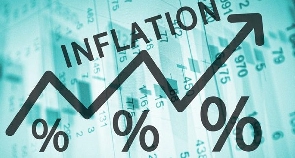 GSS says the October 2020 inflation rate was 10.1%
GSS says the October 2020 inflation rate was 10.1%
The October 2020 inflation rate was 10.1 percent, 0.3 percentage point lower than what was recorded last month, the Ghana Statistical Service (GSS) has announced on Wednesday, November 11.
According to the GSS, the month-on-month inflation between September 2020 and October 2020 was 0.2 percent.
This contrasts with the negative month-on-month inflation that was observed in the previous two months.
However, this 0.2 percent is still less than observed either pre-Covid or in the months since Covid-19, the GSS added.
On average month-on-month inflation between April to July 2020 was 0.9 percent and in the six months prior to Covid-19 month-on-month inflation rate was 0.7 percent.
Again, just two of the 13 divisions had higher-than-average inflation rates – Housing, Water, Electricity and Gas (20.2%) and Food and Non-Alcoholic Beverages (12.6%).
At the regional level, the overall year-on-year inflation ranged from 1.6 percent in the Upper West Region to 15.2 percent in the Greater Accra Region.
In Greater Accra, the difference between Food (14.0%) and Non-Food inflation (16.0%) was just 2 percentage points, while in Ashanti Region this difference was 13 percentage points (17.6% compared to 4.6%).
On a month-on-month basis, Northern Region recorded the highest inflation (1.1%) and Upper West the lowest (-2.4%).
On average, rural areas showed a higher month-on-month (0.3%) but lower year-on-year inflation (8.8%) than urban areas (0.2% month-on-month and 10.5% year-on-year).
The Food and Non-Alcoholic Beverages Division recorded a year-on-year inflation rate of 12.6%. This is 1.4 percentage point higher than in August 2020 (11.2%).
This higher inflation rate for Food translates into Food having a higher contribution to overall inflation. Food contributed 54.7% to the total inflation and thus is still the predominant driver of year-on-year inflation.
Within the Food Division, Vegetables (24.9%) was the subclass with the highest rates of inflation. This high inflation for Vegetables is explained by the relatively low index for Vegetables back in October, 2019.
Compared to both September and November 2019, inflation for Vegetables would be closer to the numbers reported in the last months of around 17%. Consonant previous months, month-on-month inflation for Vegetables was negative (- 1.6%). Overall month-on-month Food inflation was -1%.
In contrast to Food inflation, Non-Food inflation decreased. Year-on-year Non-Food inflation came in at 8.3%. This is the lowest rate since April 2020.
Month-on-month Non-Food inflation was 0.3%. Three Divisions had higher month-on-month inflation between September and October 2020 than on average was recorded for these Divisions in the months before the Covid-19 pandemic.
The other ten divisions showed lower than average rates of month-on-month inflation.